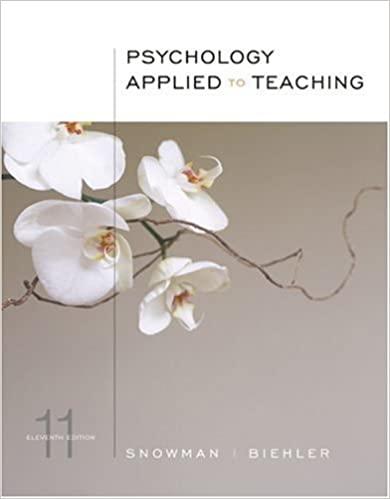Question
What insightful response can I give to this classmate? Throughout the course, my style in building a therapeutic alliance with a child has differed through
What insightful response can I give to this classmate?
Throughout the course, my style in building a therapeutic alliance with a child has differed through my perspective that children are resilient, but it does not mean they do not need to process their trauma or experiences. Through the readings, I found that creating a safe and empathetic environment for children to express themselves through play is essential. Initially, I thought that play therapy would be a lot more difficult for the counsellor trying to "get something out" of the child, but it turns out the opposite. Counsellors must apply basic helping skills for children, such as reflecting feelings, restating, and tracking to respond appropriately and be present to the child (Kottman, 2011). Working with children can also be collaborated in establishing goals during play therapy or in the session when creating limits/boundaries (Cochran et al., 2010; Kottman, 2011).
I have always desired to be a child therapist but saw it as daunting because of the boundaries and confrontation you must instill. However, after reading about Dr. Perry's and Miss A's experiences, the skills lab, and the readings, I can see myself working with children more confidently. One thing I often hear from child therapists is that working with children is rewarding, however, dealing with the parent dynamics is what can make the process more difficult or rocky. In this case, I've learnt that psychoeducation and helping the parents understand the process to ensure that they are able to provide an environment where the child can feel safe.
References
Cochran, N. H., Nordling, W. J., & Cochran, J. L. (2010).Child-centred play therapy: A practical guide to developing therapeutic relationships with children. John Wiley & Sons.
Kottman, T. (2011).Play therapy basics and Beyond(2nd ed.). American Counseling Association.
Perry, B. D., & Szalavitz, M. (2017).The boy who was raised as a dog: And other stories from a child psychiatrist's notebook -- what traumatized children can teach us about loss, love, and healing(3rd ed.). Basic Books.
Edited by Andrea Limcangco Clarke on Jul 17 at 3:17pm
Step by Step Solution
There are 3 Steps involved in it
Step: 1

Get Instant Access to Expert-Tailored Solutions
See step-by-step solutions with expert insights and AI powered tools for academic success
Step: 2

Step: 3

Ace Your Homework with AI
Get the answers you need in no time with our AI-driven, step-by-step assistance
Get Started


